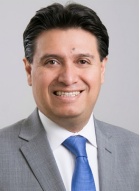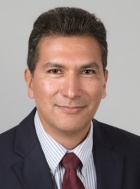Jacobs School Hispanic Community
The Graduate Student PreHealth Association honored some active members of our Jacobs School community this year. Diversity of thought and statements supporting representation in health care, were brought by Beatrice Gonzalez, MS, in this compilation.
Janine Meurer, second-year medical student - Puerto Rico, Germany and Phillippines
“Emphasis must be placed on making sure we lift up those who are underrepresented and underserved, as well as celebrating the contributions that individuals from these communities have made to society, such as in health care and STEM. This means open-mindedness, patience, and compassion are needed to understand the societal and systemic hindrances that leave these narratives out and create obstacles for a better quality of life. But most importantly, do the work to fix these problems. It is easy to feel the pressure and burden of being the only person or one of the few that looks and speaks like you, but you are there because they chose YOU.”
Raquel Gomez, second-year medical student - Colombia
“I was raised in a city that did not emphasize diversity in hospital settings. However, I would walk downtown and see people of all races. I thought, “how is it possible that there is only one race of doctors caring for so many races of patients?” You don’t see many Latinos in medicine as is, and even though it’s hard to see sometimes, don’t be afraid to join something because it’s unknown to you. As hard as it was to witness, the lack of representation, equity and diversity made me join medicine to provide that kind diversity for patients and be a part of a workforce of people who can accommodate the needs of virtually any person who comes in for care.”
Valeria Márquez-Luna, second-year medical student - Mexico
“What diversity, inclusion, and equity should be in the future, and what I see it being one day—is that everyone can go into an office or a hospital and feel like they are being listened to no matter what their race, color, or religion. They will be treated by someone that not only has empathy for them, but someone they relate to, someone that looks like them and be able to understand, not just the science behind it, but where they are coming from and be able to relate to that.”
Renato Quinones, second-year medical student - Colombia
“When there is diversity and inclusion in health care, people from different cultures are having better representation, which is important in the quality of care. Don’t let the small numbers in the health care system stop you from pursuing your goals and your passions—we are contributing to a better society, keep going!”
Pedro Rivera-Hernandez, MD - Puerto Rico
“When you don’t see yourself represented in the medical community, what you are being told is that you don’t belong here. We have to constantly remind ourselves of the power of our own individuality and know there’s something special about being different from everybody. Having patients see someone that looks like them who is treating them and caring for them, changes their experience with the health care system. We must foster an environment of inclusivity while diversifying the workforce and making our patients feel that they belong because they absolutely do; we all do!”
Maria L. Wilson - Chile
“The quality of health care needs to be equal for everybody and the standards of medical care cannot be leveled because of your race, your ethnicity or where you come from. We all have a right to live a fulfilled life. The road to equity is a very hard one to take, but in the end you will feel that you’re making a difference not only in your Hispanic community, but also for the generations to come.”
Jazmin Corral, PhD candidate - Mexico
“Although, the Hispanic representation in science is low, you can be part of it and demonstrate that we are capable of becoming great scientist. Each of us has a history and a path that makes us unique — I believe that diversity in STEM is very important, as we all have something to share. Inclusion makes all of us feel like we belong, and we are appreciated. Never give up on your dreams, and do not let anyone discourage you. The path to becoming a scientist may be hard; there are days where you doubt if you really want to do it, but it is worth it. Getting to where I am right now makes me so happy because every sacrifice has been worth it.”
Sergio Hernandez, MD - Cuba
“It’s important for people to see themselves in health care across the board— ethnically, racially, culturally and gender identity. You must hold on to your Hispanic roots and embrace your culture, because it's very easy to leave it behind in the pursuit of medical school and science — so much of patient interactions and rapport is based in culture, languages, and an understanding of that background. If that’s a community that you plan to serve, there’s going to be a lot of need to provide a degree of representation and navigation of cultures the way other people can’t. Work as hard as you can; while things may have gotten better, there is still a degree of privilege and support to others that’s not necessarily afforded to us.”
Bryan Velez, second-year medical student - Colombia
”It’s important for the younger generation to see people who look just like them in positions that they aspire to be in. It shows them that they are capable of accomplishing their goals. When I was accepted into medical school, I was proud of my accomplishments; but I was even more proud of being able to help represent the Latino community in a career that lacks so many of us. If being in health care is the career you want, then the only barrier that should be between you and your aspirations is yourself. No matter what barriers life throws at us, we are a community that always perseveres through hardships. Always believe in yourself! ¡Vamos!”
Beatrice Gonzalez, MS - Puerto Rico and Ecuador
“A year ago, I withdrew my medical school application from 26 programs, and now, I am leading student advocacy and engagement initiatives across all educational programs within Penn State College of Medicine, providing strategic and pragmatic organizational development guidance. Not only are we needed in health care and science, but we are needed in politics and bureaucracy in order to have an impact on a larger scale to break down the systemic and structural racism that continues the cycle of inequities for BIPOC. We can’t ignore how historical and institutional dynamics produce cumulative and persistent disparities for communities of color in this country. Yes, we can provide excellent health care to our patients and a level of cultural competency that can’t be taught. But social determinants of health will continue to play a major factor in health inequities unless you are addressing these issues by actively advocating, challenging the system, and using your voice.”
Margarita Dubocovich, PhD - Argentina
“I am always striving to inspire junior scientists to become the best they can in whatever they do. Encouraging students to pursue their dreams and careers in sciences is the future of biomedical and behavioral science.”
Giovanni Perez, MD - Ecuador
“Patients and families who are first or second-generation U.S. citizens are at a disadvantage since they don’t know how to navigate the complex health care system. Even families on Medicaid or other insurance can not get the access they need, which dramatically impacts their health and well-being. Cultural competence is essential. You can see the difference when someone treats patients with a similar background/culture who can speak to them in the same language. You can see in their eyes how happy they are now they can finally understand what is going on. Unfortunately, our health care system is broken at many levels. We must commit to improving cultural representation in health care to improve patient outcomes and build stronger communities.”
Marco Flores, first-year medical student - Honduras
“Diversity and inclusion in medicine is about celebrating each other’s differences in order to provide the best care possible to our patients. Diversity promotes many perspectives. I hope to become a practicing physician in a specialty that I enjoy while inspiring other Hispanic people to chase their passions and goals. My advice for Latino/a, Latinx/e, and Hispanic students is that it’s OK to do what your heart is telling you to do. Don’t be scared to take a leap at something that hasn’t been done in your family before.”
Oscar Gomez, MD - Colombia
”Inequity in health care for minorities and immigrants has prevailed in this country for too long, especially among those from low socio-economic background. That is wrong and it must change. Health is a human right, and everybody should have access to it regardless of race, ethnicity, and socio-economic background. In addition, there’s a low proportion of African-Americans, Hispanics, and Native Americans serving as a health care providers, educators, or scientists. This needs to change too. It is very important that everyone get the same opportunity to reach higher education and participation in health care.”













